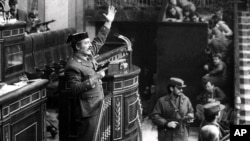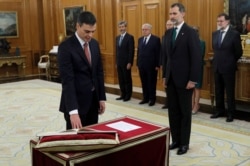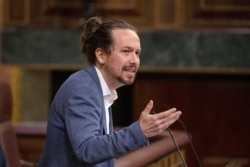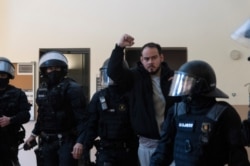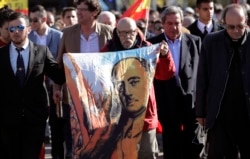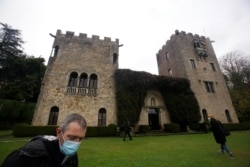Spain will on Tuesday mark the anniversary of a failed military coup, a moment in history which marked the triumph of democracy over the forces of dictatorship.
In 1981, nearly six years after the death of longtime ruler General Francisco Franco, more than 200 armed troops loyal to him stormed the Spanish parliament, firing assault rifles over the heads of terrified members of parliament who were preparing to vote on a new government.
Juan Carlos, the then king of Spain, faced down the coup plotters by making a live television broadcast and appealing for respect for the country's democratic constitution which was passed in 1978.
Four decades later, King Felipe VI will join Spain's Prime Minister Pedro Sanchéz to mark the anniversary in the Congress of Deputies, which still bears the bullet marks from the putsch.
However, despite Spain's transition away from dictatorship, which has been revered internationally, some now doubt its democratic credentials.
Catalonia
A schism has developed at the heart of Spain's left-wing coalition government on whether Spain is what some describe as a “full” democracy.
Pablo Iglesias, the deputy prime minister and leader of the far-left Unidas Podemos party, the junior partner in the coalition government, told the parliament last week there was “no democratic normality” in Spain.
Iglesias contends that the jailing of nine Catalan pro-independence politicians over their roles in the 2017 illegal secessionist referendum was an assault on freedom of speech. Opponents of Catalan independence say the politicians broke the law and must pay the price.
In 2019, nine Catalan politicians were imprisoned for between nine and 13 years for their parts in staging the secessionist vote and a subsequent unilateral declaration of independence weeks later.
The former Catalan president Carles Puigdemont left Spain hidden in the boot of a car and lives in Belgium with other former members of his administration. He faces charges of sedition if he returns to Spain.
Spain's Socialist Prime Minister Pedro Sánchez contradicted his deputy prime minister, telling parliament “Spain is a full democracy which was number 23 in the full democracies in the world out of 177 countries according to a study.”
Spain dropped from 16th position equal with Austria out of 167 countries to 22 the 2020 Democracy Index of The Economist Intelligence Unit, a research body, on a slightly lower score but remained part of the top group of 23 “full democracies.”
The Economist measures democracy by levels of electoral process and pluralism; how government works, political participation and culture and civil liberties.
Democracy tested
Police and protesters have clashed in cities across Spain for six nights over the jailing of a Spanish rapper Pablo Hasel in a case which has divided the country over the issue of freedom of expression — a key test of democracy.
Hasel has been jailed for nine months for glorifying terrorism for championing a left-wing terrorist group Grapo and for insulting the monarchy.
The issue has divided the government with senior figures within Podemos defending the protesters and calling for a pardon for Hasel.
Sanchez retorted: “Violence is an attack on democracy and the government will take a stand against any form of violence to ensure people's safety.”
In a surprise move, the Spanish government announced last week it would change the law to remove prison terms for offenses involving freedom of expression.
Lluis Orriols, associate professor of politics at Carlos III University in Madrid notes Iglesias is in a perfect position to change laws on liberty of expression to improve Spain's democracy.
“As deputy prime minister, he could lobby to change the law to prevent people being jailed for these offenses but what might be harder would be to introduce structural reforms which tackle deeper issues of corruption which undermine democracy.”
Franco supporters
Despite the transition to democracy, many in Spain continue to espouse the legacy of the late General Franco who is revered by some for his anti-communist stance.
The far right has experienced a recent surge with the Vox party —now the third biggest force in the country's parliament where it has 52 seats.
Vox, which has made little secret of its admiration for Franco, made a breakthrough in regional elections in Catalonia last week where it won 11 seats in a region where it had never enjoyed representation.
Emilio Silva, the president of the Association for the Recuperation of the Historical Memory, which campaigns for justice for the victims of repression during the Franco years, was a teenager at the time of the 1981 coup.
“Spain is clearly a democracy today but then again when I read today that the present government is to pay the family of Franco €1 million for taking over a property which the dictator originally stole from the people, I ask how can this happen in a modern democracy?” he said.
Pazo de Meiras, a mansion in Galicia northwestern Spain, was the summer palace for Franco but after a long legal battle, the state clawed back ownership of the property from his descendants last year.
Javier Cercas, a Spanish author whose best selling non-fiction work "Anatomy of a Moment" dealt with the failed coup, said it was a defining moment for Spanish democracy. “The importance of it is that it was the moment when we passed from civil war to democracy,” he told VOA.




